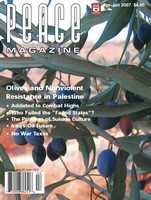
Peace Magazine Apr-Jun 2007, page 5. Some rights reserved.
Search for other articles by various here
The climate change conference on December 1st at the University of Toronto sounds fascinating. Your analysis of the situation (four controversial points of view) paints a dire situation for the planet. Most people are still grasping the issue of climate change and how it will affect them: How can I reduce my energy footprint and still enjoy the modern conveniences of life?
It's difficult to justify either the up-front extra expense of the hybrid engine or giving up your car. If you choose public transit to get around, your commute is generally slower (but you can read or listen to your iPod).At home, it makes sense to have a geothermal heat pump to heat your house, but once again, there's a lot of extra investment up front required for that.
Making simple and easy choices is a good start, though. The first ones are as simple as turning down your water heater, and switching off lights. Buy local and reduce the carbon needed to get food to your plate. Only use your car once a week for errands. For short trips, walk, bike, or use public transit. Take one less plane trip than you need to.
Tim Boychuk
Grimsby, Ontario
After Tony Blair had to rely on Conservative leader David Cameron to force through the white paper on renewing Trident, MPs from several parties joined protesters outside the Houses of Parliament and vowed to continue the campaign to persuade the government to implement its treaty obligations and eliminate Britain's nuclear arsenal. In rallies in Edinburgh and London, they made clear that this was a long-term security issue and it would have to be won by long term persistent campaigning.In the past six months there have been over 500 arrests at Faslane and Aldermaston, but the civil resistance is just getting started. Local and Scottish parliament votes scheduled for May 3 are likely to be viewed as a referendum on Blair's legacy, including his nuclear proliferation policies. Civil society is just gearing up, and there is still everything to play for.
The government's motion was carried by 409 votes to 161. Though these figures make Blair's victory look comfortable, it was anything but. In fact, almost half of Labour's backbenchers - 88 - rebelled and joined the Liberal Democrats and others in voting against the White Paper. In doing so, they had to defy the three-line-whip - the strongest level of party instruction.
All through the day, there were scenes of protest outside the Palace of Westminster and lines of people waiting to enter Parliament to talk to their MPs. Up to 20 nonviolent activists were arrested as some locked onto a large Trident effigy filled with concrete and blocked roads leading to Westminster, while others blocked the gates of the Faslane naval base in Scotland. Greenpeace climbers scaled a crane next to Big Ben and for 36 hours displayed their large banner protesting Tony Blair's love affair with WMD, while Faslane peace campaigners climbed atop the Holyrood Parliament in Edinburgh and demanded that Trident be disarmed and evicted from Scotland.
The vote ends the preparatory phase of the campaign. And after the vote, civil society and MPs together proclaimed that the campaign to rid Britain of its weapons of mass destruction would intensify and spread.
Rebecca Johnson
London, UK
I participated in a large global symposium in Lucknow, India, in December on the theme: "The World in One Peace."
Mr. Jagdish Gandhi (apparently not a blood relation of the Mahatma), coordinated that gathering. He founded, many years ago, the thriving Montessori Schools of Lucknow whose thousands of students are reared, from primary grades through high school, as World Citizens. Many of the older students attended events in our conference and I took the opportunity to sit in on some classes. Then we marched togetherfor peace through the streets of Lucknow, and returned back to the spacious grounds of their school.
Our conference was attended by peace activists, researchers and educators from 90 countries, and occurred in conjunction with a conference of many of the World's Chief Justices, including Justice C. G. Weeramantry, former vice-president of the International Court of Justice and recipient of UNESCO's award as the leading peace educator in 2006. Their goal: to mobilize the power of law.
Eryl Court
Toronto

Peace Magazine Apr-Jun 2007, page 5. Some rights reserved.
Search for other articles by various here